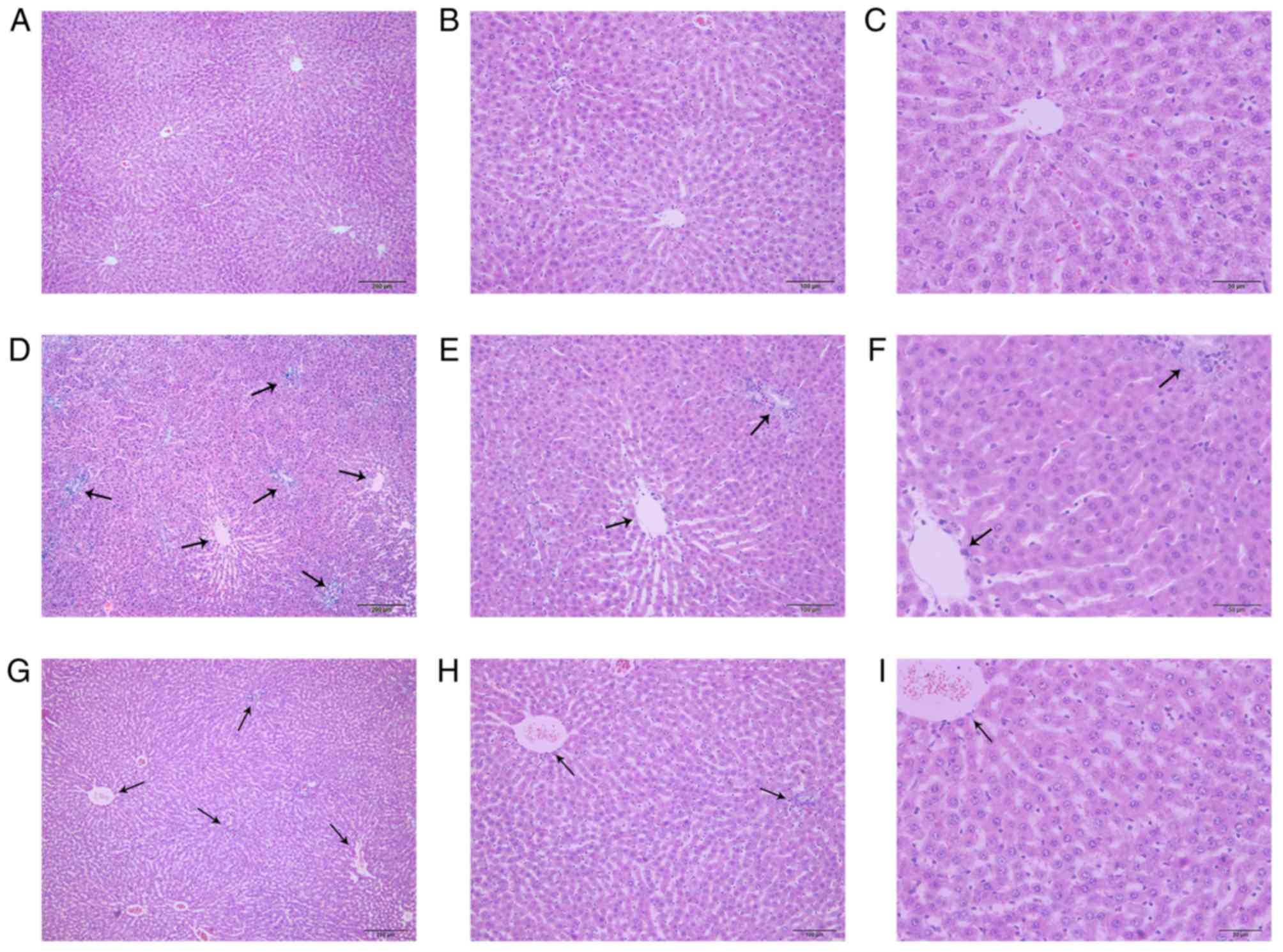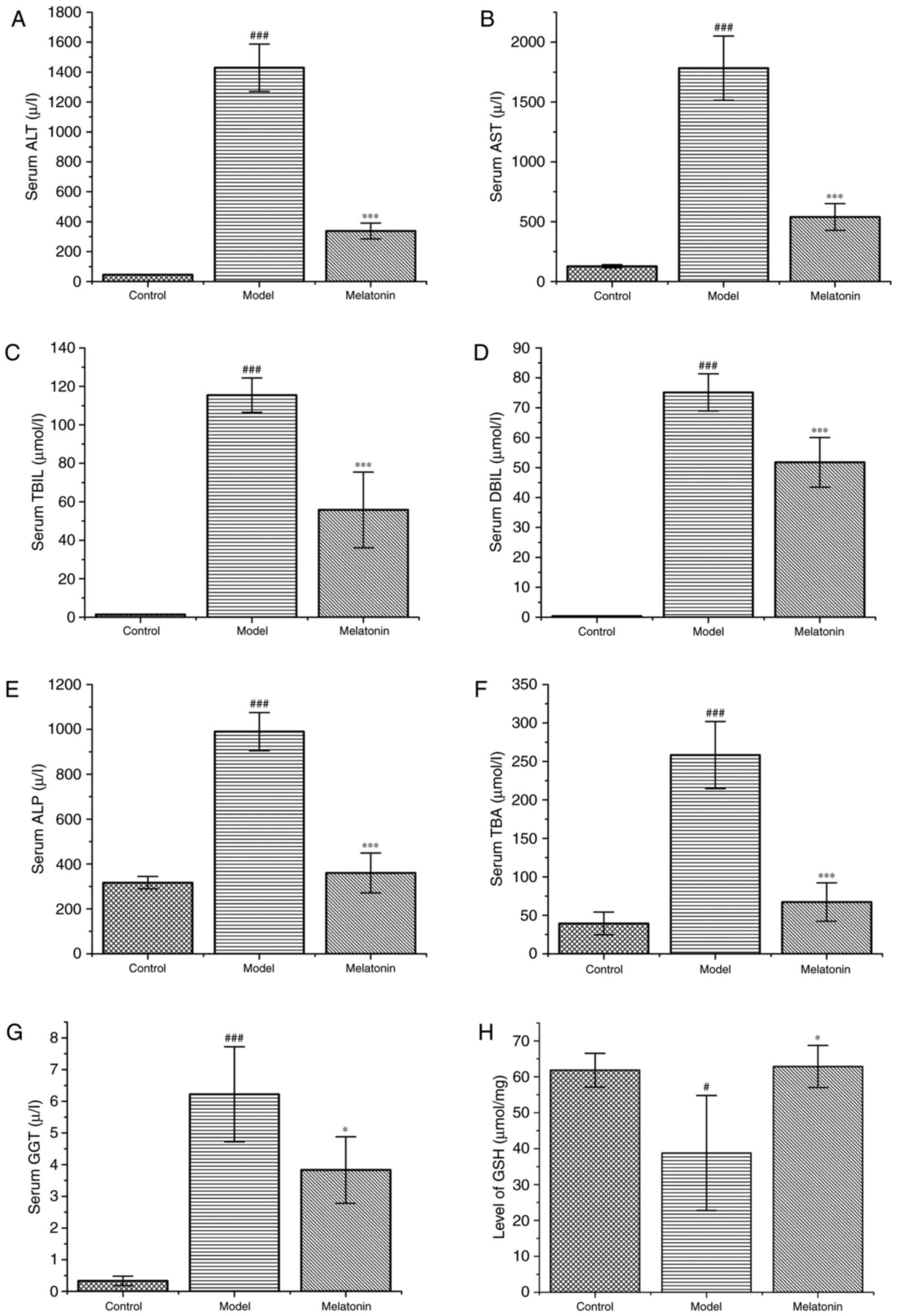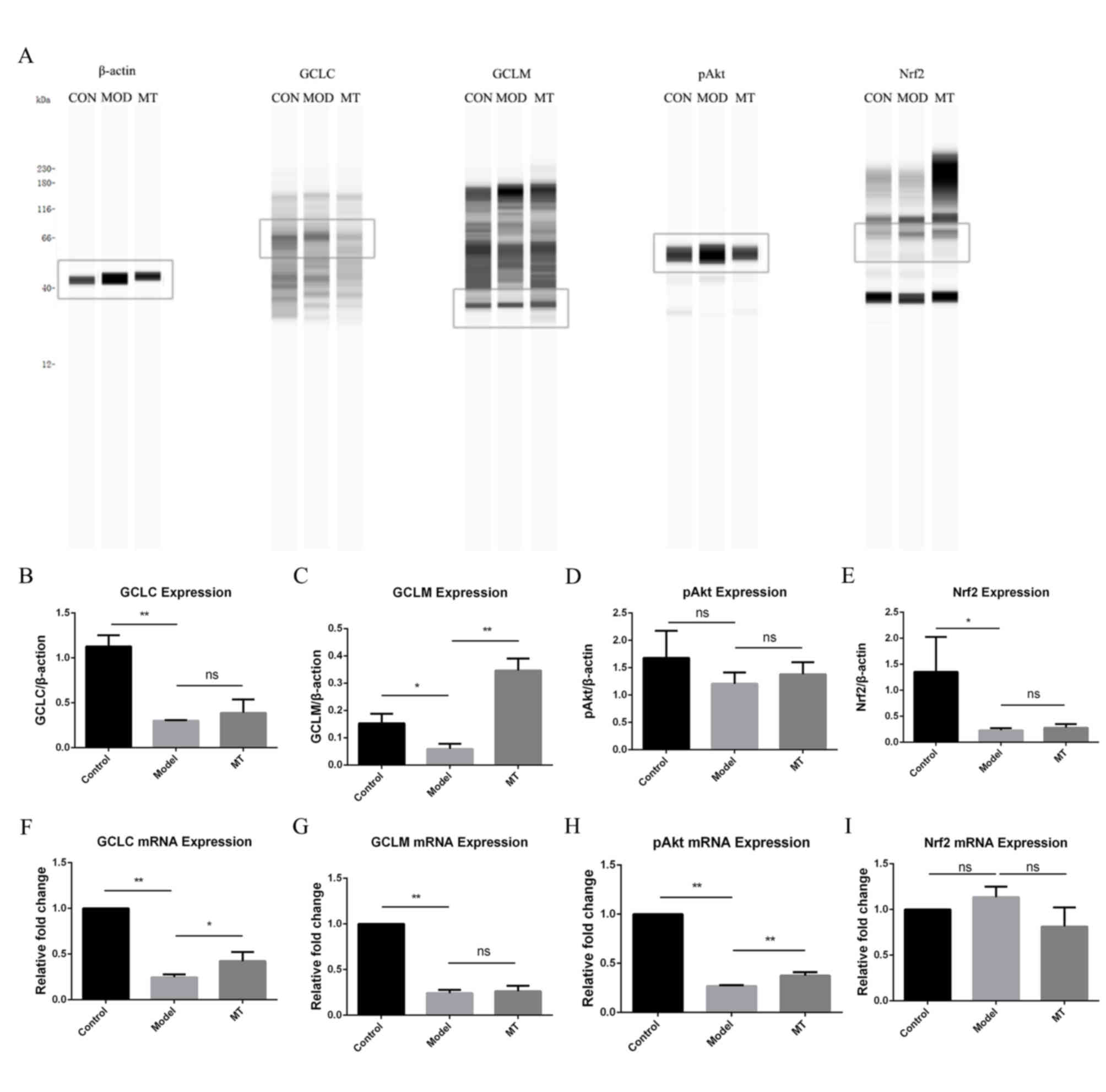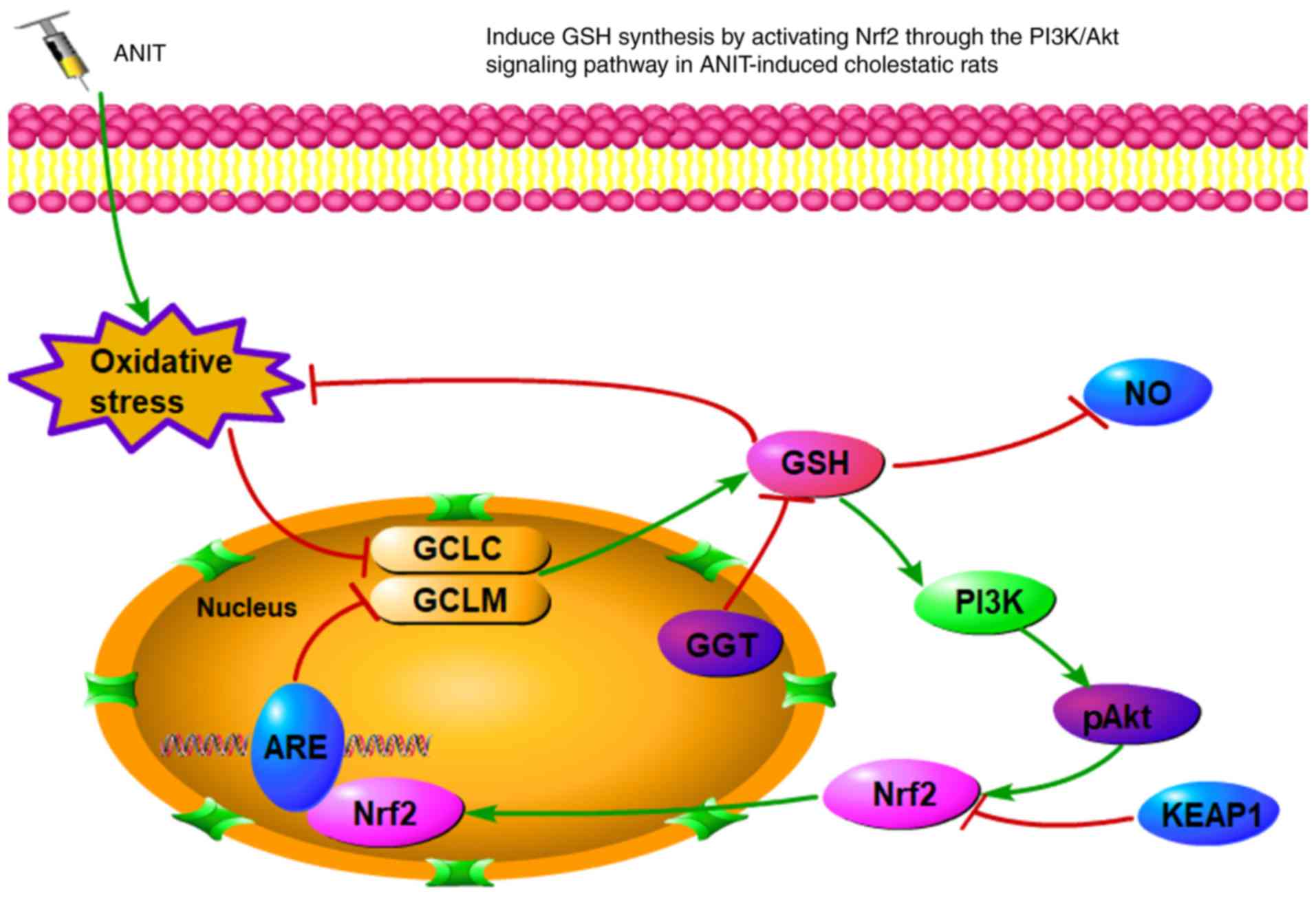|
1
|
Yang K, Köck K, Sedykh A, Tropsha A and
Brouwe KL: An updated review on drug-induced cholestasis:
Mechanisms and investigation of physicochemical properties and
pharmacokinetic parameters. J Pharm Sci. 102:3037–3057. 2013.
View Article : Google Scholar : PubMed/NCBI
|
|
2
|
Cao X, Gao Y, Zhang W, Xu P, Fu Q, Chen C,
Li C, Yang C, Ma G, Qu Y, et al: Cholestasis morbidity rate in
first-hospitalized patients with chronic liver disease in Shanghai.
Zhonghua Gan Zang Bing Za Zhi. 23:569–573. 2015.(In Chinese).
PubMed/NCBI
|
|
3
|
Cheng J, Wang J, Zhang W, Yang X and Cao
Y: A cross-sectional study on intrahepatic cholestasis indicators
of viral hepatitis patients. J Hepatol. 62 Suppl 2:pp05922015.
View Article : Google Scholar
|
|
4
|
Park HW, Lee NM, Kim JH, Kim KS and Kim
SN: Parenteral fish oil-containing lipid emulsions may reverse
parenteral nutrition-associated cholestasis in neonates: A
systematic review and meta-analysis. J Nutr. 145:277–283. 2015.
View Article : Google Scholar : PubMed/NCBI
|
|
5
|
Trauner M, Meier PJ and Boyer JL:
Molecular pathogenesis of cholestasis. N Engl J Med. 339:1217–1227.
1998. View Article : Google Scholar : PubMed/NCBI
|
|
6
|
Wagner M, Zollner G and Trauner M: New
molecular insights into the mechanisms of cholestasis. J Hepatol.
51:565–580. 2009. View Article : Google Scholar : PubMed/NCBI
|
|
7
|
Copple BL, Jaeschke H and Klaassen CD:
Oxidative stress and the pathogenesis of cholestasis. Semin Liver
Dis. 30:195–204. 2010. View Article : Google Scholar : PubMed/NCBI
|
|
8
|
Hill DA and Roth RA:
Alpha-naphthylisothiocyanate causes neutrophils to release factors
that are cytotoxic to hepatocytes. Toxicol Appl Pharmacol.
148:169–175. 1998. View Article : Google Scholar : PubMed/NCBI
|
|
9
|
Hill DA, Jean PA and Roth RA: Bile duct
epithelial cells exposed to alpha-naphthylisothiocyanate produces a
factor that causes neutrophil-dependent hepatocellular injury in
vitro. Toxicol Sci. 47:118–125. 1999. View Article : Google Scholar : PubMed/NCBI
|
|
10
|
Waters NJ, Holmes E, Williams A,
Waterfield CJ, Farrant RD and Nicholson JK: NMR and pattern
recognition studies on the time-related metabolic effects of
alpha-naphthylisothiocyanate on liver, urine, and plasma in the
rat: An integrative metabonomic approach. Chem Res Toxicol.
14:1401–1412. 2001. View Article : Google Scholar : PubMed/NCBI
|
|
11
|
Capizzo F and Roberts RJ:
-Naphthylisothiocyanate (ANIT)-induced hepatotoxicity and
disposition in various species. Toxicol Appl Pharmacol. 19:176–187.
1971. View Article : Google Scholar : PubMed/NCBI
|
|
12
|
Plaa GL and Priestly BG: Intrahepatic
cholestasis induced by drugs and chemicals. Pharmacol Rev.
28:207–273. 1976.PubMed/NCBI
|
|
13
|
Acuña-Castroviejo D, Escames G, Venegas C,
Díaz-Casado ME, Lima-Cabello E, López LC, Rosales-Corral S, Tan DX
and Reiter RJ: Extrapineal melatonin: Sources, regulation, and
potential functions. Cell Mol Life Sci. 71:2997–3025. 2014.
View Article : Google Scholar : PubMed/NCBI
|
|
14
|
Pääkkönen T, Mäkinen TM, Leppäluoto J,
Vakkuri O, Rintamäki H, Palinkas LA and Hassi J: Urinary melatonin:
A noninvasive method to follow human pineal function as studied in
three experimental conditions. J Pineal Res. 40:110–115. 2006.
View Article : Google Scholar : PubMed/NCBI
|
|
15
|
Claustrat B and Leston J: Melatonin:
Physiological effects in humans. Neurochirurgie. 61:77–84. 2015.
View Article : Google Scholar : PubMed/NCBI
|
|
16
|
Calvo JR, González-Yanes C and Maldonado
MD: The role of melatonin in the cells of the innate immunity: A
review. J Pineal Res. 55:103–120. 2013. View Article : Google Scholar : PubMed/NCBI
|
|
17
|
Zang LY, Cosma G, Gardner H and Vallyathan
V: Scavenging of reactive oxygen species by melatonin. Biochim
Biophys Acta. 1425:469–477. 1998. View Article : Google Scholar : PubMed/NCBI
|
|
18
|
Longoni B, Salgo MG, Pryor WA and
Marchiafava PL: Effects of melatonin on lipid peroxidation by
oxygen radicals. Life Sci. 62:853–859. 1998. View Article : Google Scholar : PubMed/NCBI
|
|
19
|
Allegra M, Reiter RJ, Tan DX, Gentile C,
Tesoriere L and Livrea MA: The chemistry of melatonin's interaction
with reactive species. J Pineal Res. 34:1–10. 2003. View Article : Google Scholar : PubMed/NCBI
|
|
20
|
Lotufo CM, Lopes C, Dubocovich ML, Farsky
SH and Markus RP: Melatonin and N-acetylserotonin inhibit leukocyte
rolling and adhesion to rat microcirculation. Eur J Pharmacol.
430:351–357. 2001. View Article : Google Scholar : PubMed/NCBI
|
|
21
|
Batllori M, Molero-Luis M, Arrabal L,
Heras JL, Fernandez-Ramos JA, Gutiérrez-Solana LG, Ibáñez-Micó S,
Domingo R, Campistol J, Ormazabal A, et al: Urinary
sulphatoxymelatonin as a biomarker of serotonin status in biogenic
amine-deficient patients. Sci Rep. 7:146752017. View Article : Google Scholar : PubMed/NCBI
|
|
22
|
Hoyos M, Guerreo JM, Perez-Cano R, Olivan
J, Fabiani F, Garcia-Pergañeda A and Osuna C: Serum cholesterol and
lipid peroxidation decreased by melatonin in diet-induced
hypercholesterolemic rats. J Pineal Res. 28:150–155. 2000.
View Article : Google Scholar : PubMed/NCBI
|
|
23
|
Ohta Y, Kongo M, Sasaki E, Ishiguro I and
Harada N: Protective effect of melatonin against
alpha-naphthylisothiocyanate-induced liver injury in rats. J Pineal
Res. 29:15–23. 2000. View Article : Google Scholar : PubMed/NCBI
|
|
24
|
Jung KH, Hong SW, Zheng HM, Lee DH and
Hong SS: Melatonin downregulates nuclear erythroid 2-related factor
2 and nuclear factor-kappaB during prevention of oxidative liver
injury in a dimethylnitrosamine model. J Pineal Res. 47:173–183.
2009. View Article : Google Scholar : PubMed/NCBI
|
|
25
|
Ohta Y, Kongo-Nishimura M, Imai Y and
Kitagawa A: Melatonin attenuates disruption of serum cholesterol
status in rats with a single alpha-naphthylisothiocyanate
treatment. J Pineal Res. 42:159–165. 2007. View Article : Google Scholar : PubMed/NCBI
|
|
26
|
Ding RB, Tian K, Cao YW, Bao JL, Wang M,
He C, Hu Y, Su H and Wan JB: Protective effect of panax notoginseng
saponins on acute ethanol-induced liver injury is associated with
ameliorating hepatic lipid accumulation and reducing
ethanol-mediated oxidative stress. J Agric Food Chem. 63:2413–2422.
2015. View Article : Google Scholar : PubMed/NCBI
|
|
27
|
Han D, Hanawa N, Saberi B and Kaplowitz N:
Mechanisms of liver injury. III. Role of glutathione redox status
in liver injury. Am J Physiol Gastrointest Liver Physiol.
291:G1–G7. 2006. View Article : Google Scholar : PubMed/NCBI
|
|
28
|
Copple IM, Goldring CE, Kitteringham NR
and Park BK: The Nrf2-Keap1 defence pathway: Role in protection
against drug-induced toxicity. Toxicology. 246:24–33. 2008.
View Article : Google Scholar : PubMed/NCBI
|
|
29
|
Kensler TW and Wakabayashi N: Nrf2: Friend
or foe for chemoprevention? Carcinogenesis. 31:90–99. 2010.
View Article : Google Scholar : PubMed/NCBI
|
|
30
|
Chen Z, Ma X, Zhu Y, Zhao Y, Wang J, Li R,
Chen C, Wei S, Jiao W, Zhang Y, et al: Paeoniflorin ameliorates
ANIT-induced cholestasis by activating Nrf2 through an
PI3K/Akt-dependent pathway in rats. Phytother Res. 29:1768–1775.
2015. View Article : Google Scholar : PubMed/NCBI
|
|
31
|
Ma X, Zhao YL, Zhu Y, Chen Z, Wang JB, Li
RY, Chen C, Wei SZ, Li JY, Liu B, et al: Paeonia lactiflora Pall.
Protects against ANIT-induced cholestasis by activating Nrf2 via
PI3K/Akt signaling pathway. Drug Des Devel Ther. 9:5061–5074.
2015.PubMed/NCBI
|
|
32
|
Sykiotis GP and Bohmann D:
Stress-activated cap‘n'collar transcription factors in aging and
human disease. Sci Signal. 3:re32010. View Article : Google Scholar : PubMed/NCBI
|
|
33
|
Livak KJ and Schmittgen TD: Analysis of
relative gene expression data using real-time quantitative PCR and
the 2(-Delta Delta C(T)) method. Methods. 25:402–408. 2001.
View Article : Google Scholar : PubMed/NCBI
|
|
34
|
Kossor DC, Meunier PC, Handler JA, Sozio
RS and Goldstein RS: Temporal relationship of changes in
hepatobiliary function and morphology in rats following
alpha-naphthylisothiocyanate (ANIT) administration. Toxicol Appl
Pharmacol. 119:108–114. 1993. View Article : Google Scholar : PubMed/NCBI
|
|
35
|
Enomoto A, Itoh K, Nagayoshi E, Haruta J,
Kimura T, O'Connor T, Harada T and Yamamoto M: High sensitivity of
Nrf2 knockout mice to acetaminophen hepatotoxicity associated with
decreased expression of ARE-regulated drug metabolizing enzymes and
antioxidant genes. Toxicol Sci. 59:169–177. 2001. View Article : Google Scholar : PubMed/NCBI
|
|
36
|
Jowsey IR, Jiang Q, Itoh K, Yamamoto M and
Hayes JD: Expression of the aflatoxin B1-8,9-epoxide-metabolizing
murine glutathione S-transferase A3 subunit is regulated by the
Nrf2 transcription factor through an antioxidant response element.
Mol Pharmacol. 64:1018–1028. 2003. View Article : Google Scholar : PubMed/NCBI
|
|
37
|
Okawa H, Motohashi H, Kobayashi A,
Aburatani H, Kensler TW and Yamamoto M: Hepatocyte-specific
deletion of the keap1 gene activates Nrf2 and confers potent
resistance against acute drug toxicity. Biochem Biophys Res Commun.
339:79–88. 2006. View Article : Google Scholar : PubMed/NCBI
|
|
38
|
Umemura T, Kuroiwa Y, Kitamura Y, Ishii Y,
Kanki K, Kodama Y, Itoh K, Yamamoto M, Nishikawa A and Hirose M: A
crucial role of Nrf2 in in vivo defense against oxidative damage by
an environmental pollutant, pentachlorophenol. Toxicol Sci.
90:111–119. 2006. View Article : Google Scholar : PubMed/NCBI
|
|
39
|
Anwer MS: Role of protein kinase C
isoforms in bile formation and cholestasis. Hepatology.
60:1090–1097. 2014. View Article : Google Scholar : PubMed/NCBI
|
|
40
|
Arisawa S, Ishida K, Kameyama N, Ueyama J,
Hattori A, Tatsumi Y, Hayashi H, Yano M, Hayashi K, Katano Y, et
al: Ursodeoxycholic acid induces glutathione synthesis through
activation of PI3K/Akt pathway in HepG2 cells. Biochem Pharmacol.
77:858–866. 2009. View Article : Google Scholar : PubMed/NCBI
|
|
41
|
Lu SC: Regulation of glutathione
synthesis. Mol Aspects Med. 30:42–59. 2009. View Article : Google Scholar : PubMed/NCBI
|


















